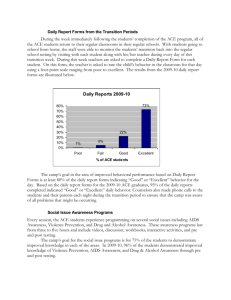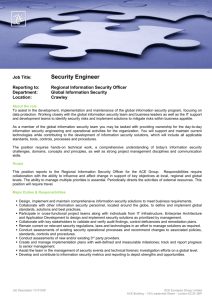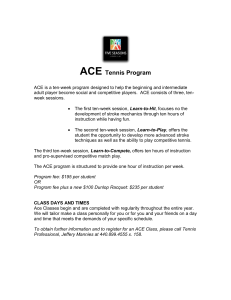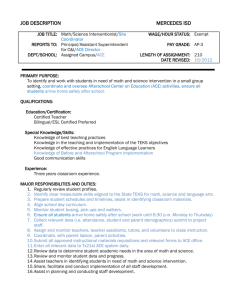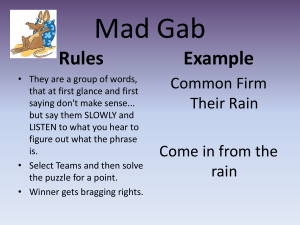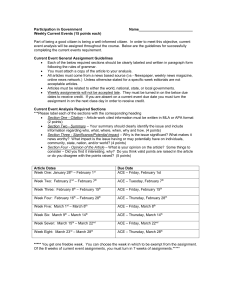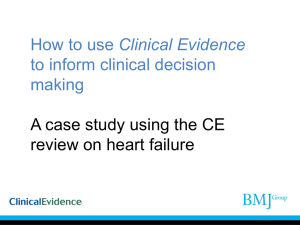To degree or not to degree
advertisement
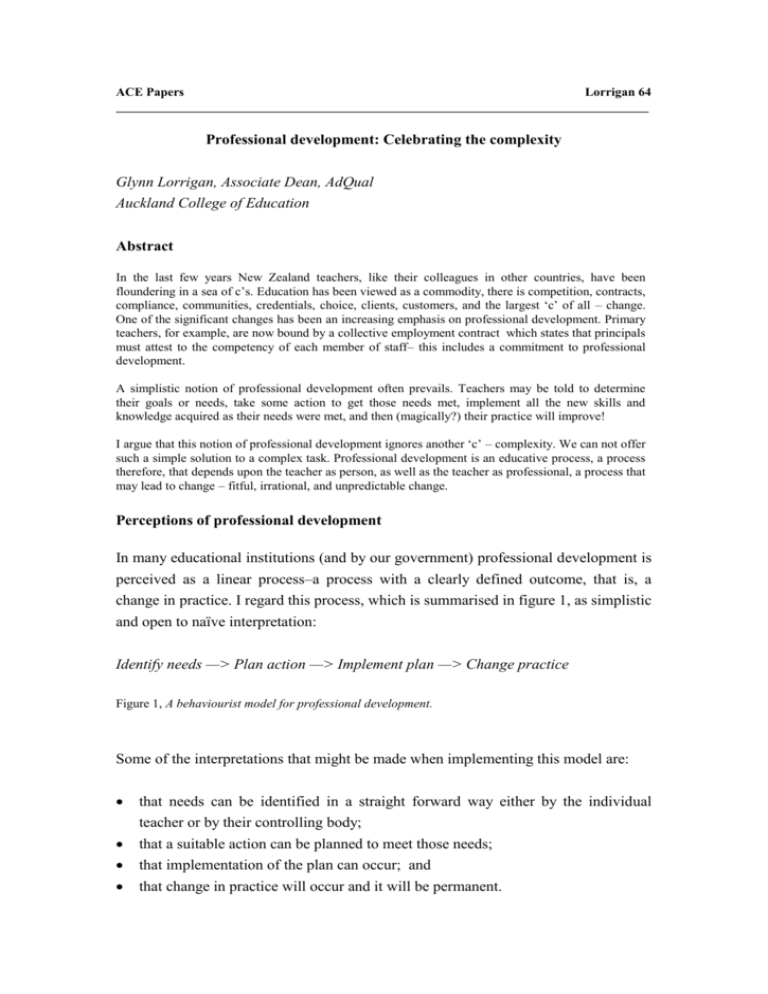
ACE Papers Lorrigan 64 __________________________________________________________________________________ Professional development: Celebrating the complexity Glynn Lorrigan, Associate Dean, AdQual Auckland College of Education Abstract In the last few years New Zealand teachers, like their colleagues in other countries, have been floundering in a sea of c’s. Education has been viewed as a commodity, there is competition, contracts, compliance, communities, credentials, choice, clients, customers, and the largest ‘c’ of all – change. One of the significant changes has been an increasing emphasis on professional development. Primary teachers, for example, are now bound by a collective employment contract which states that principals must attest to the competency of each member of staff– this includes a commitment to professional development. A simplistic notion of professional development often prevails. Teachers may be told to determine their goals or needs, take some action to get those needs met, implement all the new skills and knowledge acquired as their needs were met, and then (magically?) their practice will improve! I argue that this notion of professional development ignores another ‘c’ – complexity. We can not offer such a simple solution to a complex task. Professional development is an educative process, a process therefore, that depends upon the teacher as person, as well as the teacher as professional, a process that may lead to change – fitful, irrational, and unpredictable change. Perceptions of professional development In many educational institutions (and by our government) professional development is perceived as a linear process–a process with a clearly defined outcome, that is, a change in practice. I regard this process, which is summarised in figure 1, as simplistic and open to naïve interpretation: Identify needs —> Plan action —> Implement plan —> Change practice Figure 1, A behaviourist model for professional development. Some of the interpretations that might be made when implementing this model are: that needs can be identified in a straight forward way either by the individual teacher or by their controlling body; that a suitable action can be planned to meet those needs; that implementation of the plan can occur; and that change in practice will occur and it will be permanent. 65 Lorrigan ACE Papers ___________________________________________________________________________________________ I believe that the apparent simplicity of this behaviourist model hides the complexity of the professional development process. As Hunter (1990, p xiii) states, when describing her wish-list for the outcomes of professional development, ‘ [we should] stop seeking one simple solution for working with the most complex structure in the known universe: the human brain.’ In the same vein Fullan (1990 p. 4) remarks that‘a great deal of wisdom, skill, and persistence are needed to design and carry out successful development activities.’ Tobin (1988, p. 483) is another educator who recognises that the pathway to successful professional development is, ‘tortuous and a successful journey along it requires patience, perseverance, time, and in many cases a tolerance of failure’. From a similar stance Baird (1988) comments that teachers’ learning may require changes in attitudes, perceptions, conceptions, and beliefs as well as behaviours – a very demanding process. What is professional development? While we could say that it is simply ‘the development of a professional’ the complexity of the process has been captured by the following four definitions. These state that professional development is: ‘practising educators continually learning to perform more effectively’ Butler (1996 p.265); ‘a healthy growth state sustained by a professional which leads to change in practice and beliefs that improve education’ Begg (1994 p.9); ‘improving the professional knowledge, skills and performance of an individual teacher, extending the experience of an individual teacher for career development or promotion purposes, developing the professional knowledge and understanding of an individual teacher, and extending the personal or general education of an individual teacher’, Bolam (1988 p.38); ‘the sum of all the activities, both formal and informal, carried out by the individual or system to promote staff growth and renewal’ Connors (1991, p54). For me, these definitions imply that professional development is an educative process, that is, professional development is a process that stimulates and promotes the ongoing learning of teachers with all the concomitant complexities. Professional development = learning. ACE Papers Lorrigan 66 __________________________________________________________________________________ Exploring some of my concerns with the model in Fig 1. • Who identifies needs and how are they identified? Needs may be identified by the teacher’s controlling body, in New Zealand the Ministry of Education; the school; or the individual teacher. Although the Ministry of Education has taken an active role in providing professional development programmes these do not appear to have been premised on any researched need, except the need to change practice because the curriculum has changed. Often these changes have not been suggested by, or discussed at length and in detail with teachers who are often viewed as deficient in teaching skills. Similarly in schools, the teachers who comprise the teaching staff may be ignored by school managers who plan the changes and the professional development programmes they want, in the school they manage, with little appreciation of the individual teachers/learners (Hargreaves, 1994). In some schools appraisal systems are viewed as mechanisms to identify both individual teacher’s and the school’s professional development needs. Recent research has been critical of many appraisal systems. Townsend (1998) and McMullen (1991) for instance, both comment that even when development is part of an appraisal system, needs analysis is difficult. Often appraisal is a method of information collection and this information is used as ‘evidence’. Presumptions can be made about the amount and type, and the interpretation of this evidence, as well as about the appraisee. Covert judgements may be made and trust betrayed. Assumptions about what is happening in and around the school can also be made. Negotiation, commitment and consensus are often ignored. Most disturbingly, from a professional development perspective, is Edwards’ (1992 p.2) comment that there is, ‘no clear evidence from research that appraisal produces better teaching and learning’. This is reinforced by Fullan (1991 p.323) who reported that, ‘… 84 percent of the over 3,000 teachers surveyed indicated little or no improvement as a result of the appraisal process.’ Fullan continues by stating that teacher evaluation schemes ‘… serve to undercut rather than enhance teacher development.’ 67 Lorrigan ACE Papers ___________________________________________________________________________________________ Even if the individual teacher is assumed by their controlling body or their school, to be a self-directed and responsible learner, identification of their needs can be difficult. Reflection may assist the process of needs analysis, but there may be particular problems for those who spend much of their lives looking after the needs of others and who may subsume their own needs. Robertson (1992) highlights the fact that, even in a professional situation, for example when discussions about professional development occur, women teachers’ points of view are often not heard. She argues that women who may engage with multiple ways of knowing and respect intuitive knowledge and a revaluing of the tentative, and who acknowledge the uncertainties in an approach which values the personal, may find it particularly difficult to be objective and isolate their specific needs. • Can a suitable action be planned to meet professional development needs and can implementation of the plan occur? Translation of perceived needs into action is difficult. Sometimes there may be no action at all, or haphazard, unfair, and inappropriate action. Actions, of course, can be planned and plans can be implemented but whether these include specific plans to meet professional development objectives has been challenged by educators including Robinson (1989). He raises concerns about the identification of professional development objectives and then designing a programme to get these met ie a meansends approach. He states that ‘professional development is, or should be, an educative process and in education the ends or objectives are always problematic’ (1989 p.274). He continues by saying that in education the innovative process brings about change in the objectives themselves and therefore we cannot operate on the basis of first defining our objectives and then devising solutions, as often the objectives themselves are precisely what is in question. Another problem is that while programmes may be viewed as educative by some teachers, they may not be viewed that way by other teachers. Professional development programmes need to account for the differences in teachers’ implicit theories of learning and therefore teaching, the differences in their experiences, in their prior understandings, their characteristics, their career stage. Robinson sums this up by stating ‘…whether something is educative depends just as much on the recipient [teacher] as on the educator …’ (ibid). ACE Papers Lorrigan 68 __________________________________________________________________________________ This model may also encourage teachers to aim for a particular ‘correct’ end state in their professional development pre-supposing that there is a ‘recipe or prescription for “exemplary practice” in teaching which is universally applicable by all or most teachers…’ (Robinson 1989 p. 275) and universally acceptable to all or most students. We know this simplistic view is not true. Teaching is a complex undertaking which takes into account differing student needs and which involves teachers in critical reasoning, investigating options, comparing and contrasting evidence, and reflection, to improve the quality of their decision making and actions (Eraut, 1995; Hargreaves, 1994). • Can change in practice occur and it will it be permanent? Much has been written about the change process and factors that contribute to its success (Fullan 1990; Guskey 1986; Bolam 1987; Scott 1998). Changing practice is difficult, change may be fitful, irrational, and unpredictable and it may not lead to improvement. The change may be in attitudes, beliefs, and values and not in practice. Many factors mitigate against change (Claxton and Carr 1991; Le Clercq 1999). There is acknowledgment that change depends upon the teacher’s preparedness to learn, as well as on the culture of the institution to which the teacher belongs, and the teacher’s place within that institution (Hargreaves, 1994; Robinson, 1989). Teachers’ personal characteristics, their histories, their conceptions of self as teacher and as person, their needs (although these may not be expressed), and their perceptions of professional development (Baird, 1988) all influence the outcome of any professional development programme. If these factors are not considered then a likely outcome is a superficial and inadequate change (Robinson 1989). Even when change occurs the change process is a lengthy one and gradual refinement of current practice (Robinson 1989) rather than the adoption of a totally new practice is a typical outcome. 69 Lorrigan ACE Papers ___________________________________________________________________________________________ Celebrating the complexity. It is not only each step in the linear model that I challenge for its susceptibility to naïve interpretation of the professional development process, but the model itself. I suggest that the complexity of children’s learning is more widely acknowledged than that of their teachers, and that the linear model of professional development views learning as a linear process with a clearly defined end-point. We know, however, that learning is a most complex activity (Begg, 1999). The behaviourist model for professional development can also be challenged because it may give licence to some to perceive teachers as objects of change, needing to meet a specified end-point, instead of as knowing and active subjects searching for their own understandings. Teachers should not feel, as Beattie (1995 p.29) described, that they are adaptors ‘of externally imposed knowledge’ or that they are being inserviced or managed! I claim that teachers can be, and should be, treated as competent and responsible professionals involved in their own, very relevant, learning and that this learning is a complex, ongoing, sometimes unpredictable and even incidental process. The treatment of teachers as objects-to-be-managed has been explored by Robinson (1989). He stated that when they are treated as the objects of change, instead of as knowing and active subjects, when their professional development is managed and has pre-determined outcomes then it is likely that there will be apparent but superficial change in teachers’ practice and a reversion to old behaviours when the pressure to change is no longer present. Robinson referred to this type of professional development as being within a management paradigm and contrasted it with an empowerment paradigm, see Table 1. ACE Papers Lorrigan 70 __________________________________________________________________________________ Aspect of Change Management Paradigm Empowerment Paradigm Focus Change Choice Source of knowledge experts/theorists teachers/practitioners Starting point new idea teacher’s own strengths and abilities Locus of power/control outside agents: consultants/ advisers teachers Indicator of success change in teachers: adoption of (someone else’s) new idea Role of teacher acolyte Expectation of teacher immediate adoption or revolution Role of outside agent change agent View of teacher obstacle to be overcome (deficient & devious) Mode of operation of outside agent propaganda/pressure to change “Images” of outside agent “salesperson” “guru” Typical outcome 1 Apparent but superficial change 2 Reversion to old behaviours when pressure to change is no longer present responsible decision making by teachers decision maker gradual development or evolution choice agent competent and responsible professional presentation of choices/support for risktaking “facilitator” “colleague” 1 Gradual refinement of current practices, perhaps leading to… 2 Decision to adopt new practice on an ongoing basis Table 1, Two Paradigms of Professional Development (Robinson 1989 p. 275). Like Robinson, I believe we need professional development programmes that offer teachers choices, that acknowledge their professionalism, that use their strengths and abilities, that offer opportunities for collaboration, and that support them to take risks in their practice. In these programmes we can encourage teachers to be involved in developing understandings and critically examining the underlying learning theories and ideologies which extend them beyond the classroom. We can involve them in the 71 Lorrigan ACE Papers ___________________________________________________________________________________________ creation of events to set their classroom practice in a broader context (Willis, 1994). We can support their learning. I believe the following assumptions are those that should be made before any professional development programme is planned: that learning is a process not a product; that teachers are self-determining learners ie they are active, responsible, competent subjects in control of their learning; that teachers should be actively involved in the programme, in sharing purposes, experiences, and decision-making and in exchanging ideas, so that learning is meaningful and relevant to each of them; that the most effective needs analysis may occur during or after a professional development programme; that planning and implementing some action may lead to unexpected, unplanned outcomes; that changing practice is difficult; that learning is continuous but may be incidental and may occur in both informal and formal situations; that collegial relationships contribute to teachers’ learning. Let us celebrate the complexity of teachers, of teaching, and of learning because it is this complexity that makes teachers interesting beings, that makes teaching exciting, that makes learning stimulating and challenging. Let us view professional development, not as a linear process open to naïve interpretation, but as a complex process that stimulates and promotes the ongoing learning of teachers, that acknowledges them as competent, responsible, and active self-determining learners able to make informed choices that assist them to perform more effectively. References Baird, J. (1988). Teachers in science education. In P. Fensham (Ed) Development and dilemmas in science education (pp. 55-72). New York: The Falmer Press. Beattie, M. (1995). Constructing professional knowledge in teaching: A narrative of change and development. New York: Teachers College Press. Begg, A. (1999). Constructivism: An overview and some implications. ACE Papers, 4, 70-92 ACE Papers Lorrigan 72 __________________________________________________________________________________ Begg, A. (1994). Professional development of high school mathematics teachers. Unpublished doctoral thesis, University of Waikato, Hamilton. Bolam, R. (1987). What is Effective INSET? Paper presented at the Professional Development and INSET: 1987 NFER Members Conference, Slough. Butler, J. (1996). Professional development: Practice as text, reflection as process, and self as locus. Australian Journal of Education, 40(3), 265-283. Claxton, G. and Carr, M. (1991). Understanding change: The personal perspective. In A. Begg, B. Bell, F. Biddulph, M. Carr, M. D. Carr, J. McChesney, J. Young Loveridge (Eds). SAMEpapers 1991 (pp. 1-14). Auckland: Longman Paul Ltd. Connors, B. (1991). Teacher development and the teacher. In P. Hughes (Ed.), Teachers professional development (pp. 53-81). Hawthorne: The Australian Council for Educational Research. Douglas, B. (1991). 'Teachers as experts': A case study of school-based staff development. In L. Bell & C. Day (Eds.), Managing the professional development of teachers (pp. 3-22). Milton Keys: Open University Press. Edwards, E.(1992). Appraising teachers. SET 1, 1-4. Eraut, M. (1995). Outcomes and professional knowledge. In J. Burke (Ed.), Outcomes, learning and the curriculum: Implications for NVQs, GNVQs and other qualifications (pp. 260-272). London: The Falmer Press Fullan, M. (1990). Staff development, innovation, and institutional development. In B. Joyce (Ed.), Changing school culture through staff development (pp. 3-25). Alexandria: Association for Supervision and Curriculum Development. Fullan, M., with Stiegelbauer, S. (1991). The new meaning of educational change. London: Cassell. Guskey, T. (1986). Staff development and the process of teacher change. Educational Researcher, 15(5), 5-12. Hargreaves, A. (1994). Restructuring restructuring: Postmodernity and the prospects for educational change. Journal of Education Policy, 9(1), 47-65 Hunter, M. (1990). Preface: Thoughts on staff development. In B. Joyce (Ed.), Changing school culture through staff development. Alexandria: ASCD publications. Le Clercq, D. (1999). Investigating preschool curriculum: Innovative professional development. Paper presented at the 4th Annual Conference of The Association of Practical Experiences in Professional Education, Christchurch. McMullen, H. (1991). The role of appraisal in staff development. In L. Bell & C. Day (Eds.), Managing the professional development of teachers (pp. 164-175). Milton Keynes: Open University Press. Robertson, H-j. (1992). Teacher development and gender equity. In A. Hargreaves & M. G. Fullan (Eds.), Understanding teacher development (pp. 43-61). London: Cassell. 73 Lorrigan ACE Papers ___________________________________________________________________________________________ Robinson, I. (1989). The empowerment paradigm for the professional development of teachers of mathematics. In N. Ellerton & M. A. Clements (Eds.), School mathematics: The challenge to change. Geelong: Deakin University. Scott, G. (1999) Change Matters: Making a difference in education and training. St Leonards: Allen & Unwin Tobin, K. (1988). Improving science teaching practices. Journal of Science Education, 10, 475-484. Townsend, F. (1998). Appraisal: As a process of betrayal. International Studies in Educational Administration, 26(1), 45-56. Comment on this paper is welcome. Please email g.lorrigan@ace.ac.nz ACE Papers Lorrigan 74 __________________________________________________________________________________
